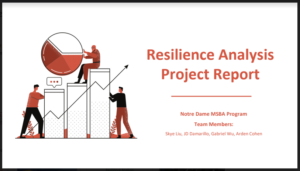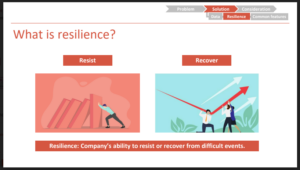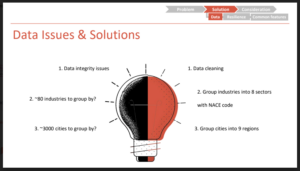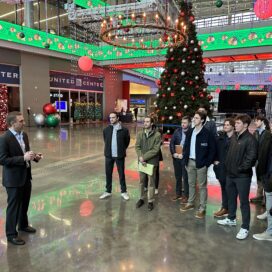How Resilience Benefits a Manufacturing Company
Author: Marshall King
What is Pannon Business Network? 
Pannon Business Network works with nearly 500 partners across Europe. The company in Szombathely, Hungary is an applied research and training center focused on manufacturing.
Balázs Barta, PBN’s managing director, wanted to understand how resilience benefits a manufacturing company. It’s a particularly important question given the war in Ukraine.
A team of students from Notre Dame’s Mendoza School of Business helped him evaluate the data and learn answers.

Resilience Analysis Capstone Project
In their capstone project, Arden Cohen, Gabriel Wu, JD Damarillo and Skye Liu first had to learn the European context, which tends to be heterogenous and complex, said Barta. “It was very interesting to bring them through and explain the environment we are in,” he said of their video calls.
Barta and the students worked at communication and differing styles as they worked together. The students were very polite and Barta worked to understand what they were truly saying as they partnered in the project.
The Notre Dame team worked with data from two decades of operations by 25,000 companies.

Slide from Capstone Project
From that data, much of it financial numbers, they were able to quantify a company’s ability to resist or recover from difficult events.
The team of students with programming and marketing skills created a final report and presentation that had value not just for Barta and PBN, but also for a broader audience. “The final document was so insightful that we have shared it with our national government as well,” he said. “It’s a big value for us.”
Because of their perspectives, the students could view the data in ways that Barta and his team couldn’t. They could see better how to cluster companies for study. Their project demonstrated that manufacturing companies in the capital differ from those in rural settings. They also found that an older company is more likely to be resilient and those that are more densely clustered geographically are more likely to be as well.

Data Slide from Presentation
“That was the kind of revelation we hadn’t seen before,” he said.
It was unique for their company in the European Union to work with a university based in the United States. Barta looks forward to more collaboration. “We think of it as a starting point,” he said.
One of the students was hired to do similar work at a company in Indiana and Barta is using the first sponsorship of Notre Dame students to launch more partnerships with manufacturers in northern Indiana. The region in western Hungary where PBN is headquartered manufactures automobiles but is battling competition because of labor costs. Medical electronics are also starting to be produced there.
As PBN focuses on automation, Barta is hopeful that partnerships in the Midwest can mutually benefit him and others as they seek to add value to companies.
Barta looks forward to working with another group of Mendoza students this coming year. They’ll work together to develop an algorithm to stop an automated machine when a camera focused on a conveyor belt registers a product problem.
Next Group’s Project




